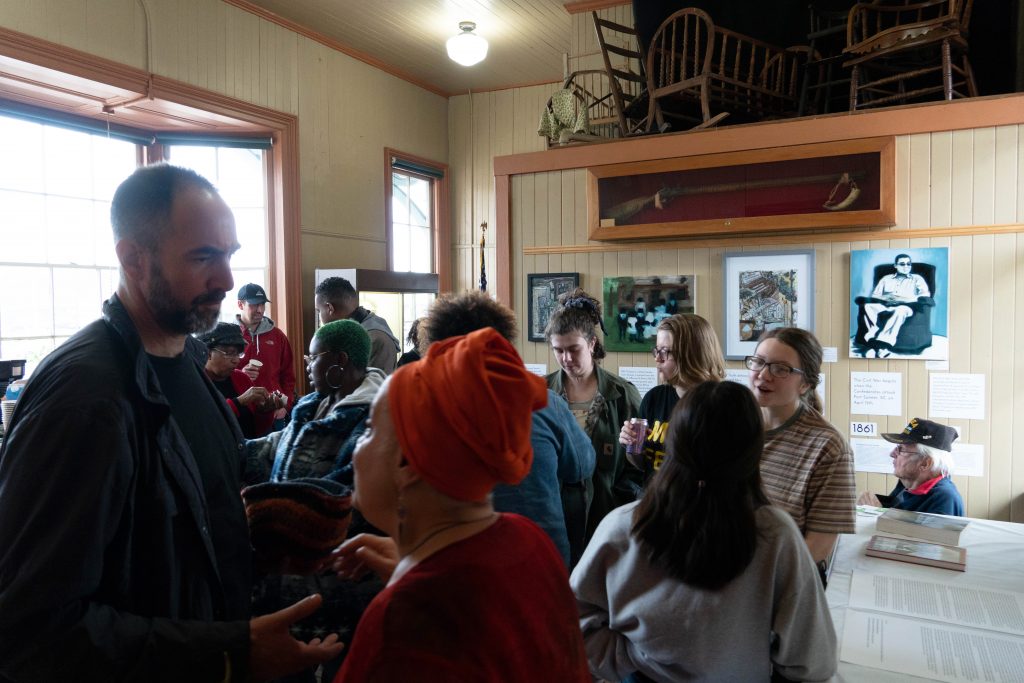In celebration of the start of Black History Month, the Vestal Museum displayed Broome County’s black history through a showcase of local artists at their exhibition, “African Road,” from 12 p.m. to 3 p.m. on Saturday.
The event featured the work of local black artists Andrea Kelleher, ‘95, Marsha Coulton, ‘94 and Helen D’Eletto, as well as a talk from researcher Brenda Cave-James. Artists presented their research and shared their narratives through various mediums such as collage, paint and pencil techniques. Art pieces were incorporated into a visual timeline of African American history, which wrapped around the walls of the museum, woven among various artifacts of black individual and family life such as census records, newspaper clippings, photographs, essays and even Bibles from the African Methodist Episcopal Zion Church.
As detailed in Vestal Museum Director Cherese Wiesner-Rosales’ essay, which is featured as part of the timeline, much of African American history in Broome County cannot be found in physical historical data or online. Instead, the information featured in the exhibition, “African Road,” largely relies on researchers who reside and base their work in the local area.
“In school, history class basically is an outline at best,” Kelleher said. “Anything in school related to African history is very basic — it’s a very at-a-glance look of what events have taken place. Unless things like this happen, people won’t know about their connection to an area — African American history is American history.”
Cave-James, who grew up right outside of Binghamton, discussed her own family roots in addition to the biographies of many forgotten figures who were crucial to black history in upstate New York. Despite the lack of records, Cave-James discussed the various towns and areas that were part of the Underground Railroad, from Scranton to Montrose to Broome County. In her talk, Cave-James shared her findings, bringing her research to life with vivid accounts of the black families who owned farmland on African Road, the lives of members of the African Methodist Episcopal Zion Church who broke off to form their own branch and serve black families in the area and the “secret rooms” used by those trying to escape slavery via the Underground Railroad. She focused specifically on the life of the Rev. J.W. Loguen, who dedicated his life to freeing slaves and promoting the education of African Americans through his church.
The exhibition was a result of the collective efforts of Wiesner-Rosales and Jessica Petrylak, gallery director of the Vestal Museum, who brainstormed with Coulton.
“A lot of our archives and what we have to work with is whitewashed, so we wanted to reach out to black artists and get their perspective because that’s who it should be coming from,” Petrylak said. “Those accounts and stories matter. We have been working with Coulton for a while, and we bounced some ideas off of her. Amplifying the voices of black artists is really important, and letting them tell their own history, because it should be coming from them.”
Coulton, a longtime partner of the Vestal Museum, said the artwork featured in the exhibition encapsulates the rich yet untold history of the black community in Broome County.
“Once [Wiesner-Rosales] told me what the idea was about, I was all over it,” Coulton said. “Being a person who went to Binghamton [University] back in the day, you have these illusions, like, ‘There’s no black people here.’ You don’t expect there’s much of a history, so it was very interesting for me to see that, yeah, indeed there is — it’s just not really shown.”
“African Road” served as a platform and learning experience for both local artists who conducted their own research as inspiration for their artwork, and for the audience who were presented with various forms of media, artifacts and work on local black history. Coulton emphasized the importance of black visibility for future generations.
“Because it’s underrepresented,” she said. “Because I myself didn’t know, and you’d think I should. So it’s nice to bring attention to something that’s been so underrepresented … I have a child — it’s good for him to start seeing that. We are up here, have been up here, to be represented … It’s good for him to help him form his identity.”
“African Road” will be open to the public for the next three months until the end of April. Admission is free for all members of the community.



